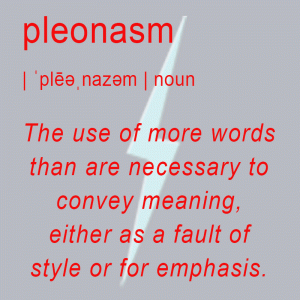 I learned a new word yesterday: pleonasm. Not only is it really, really fun to say (so, um, nasally), but in only eight letters and just three syllables, it gives name to the words I have focused really, really hard on editing out of my own writing: the ones that don’t change the meaning of a sentence.
I learned a new word yesterday: pleonasm. Not only is it really, really fun to say (so, um, nasally), but in only eight letters and just three syllables, it gives name to the words I have focused really, really hard on editing out of my own writing: the ones that don’t change the meaning of a sentence.
(In the previous sentence, there are several pleonasms, including um, only, just, and of course all those “really”s.)
Its origin, according to my computer’s “built-in” dictionary, goes all the way back in time to the 16th century, so I’m not sure how I’ve managed to miss it in lo these many years of word-collecting. It comes from the Greek for “superfluous.” But how much more appropriate is “pleonastic”, even though no one except a few dictionary geeks will know its meaning! As it gets stuck in the back of the throat, clogging up each sentence like a piece of phlegm (another fun word to say), it proves its own unnecessary-ness—and at the same time, makes itself memorable. Meanwhile, the much more popular “superfluous” slides out of us easily, usually tacked on at the end of a sentence about our own feelings; the sentence prom queen, full of self-important sibilance.
(Pleonasm also sounds like a Spoonerized version of “neoplasm” (a new and abnormal growth of tissue). Perhaps we can pleonast the next neoplast we come across.)
Wordplay is not just a fun diversion, because word choices matter. How a word sounds (and whether it sticks in our throat when we speak it) can affect the pace and tone of an entire paragraph. Ergo, editing out superfluous pleonasms (see what I did there?) matters. Once we get into the habit it might even become contagious, because the clearer and more concise we make our own writing, the more we will inspire clarity in others.
Maybe, with a little practice and enough repetition, we can make all those pleonasms disappear—though that would be a shame, since the word itself is even more fun than a prom queen.
Love it, use less to say more.
I’m very choosy in both words and mates. 🙂